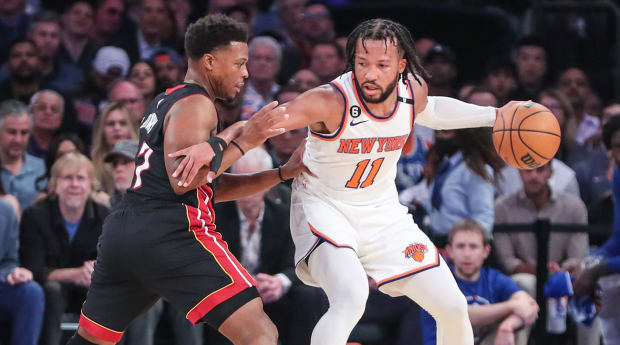This time of year, with neon names like Damian Lillard and James Harden available on the trade market, you’d normally expect the Knicks to be in the conversation as a potential landing spot.
After all, New York is a market that can more readily absorb bigger contracts. And, with the team having failed to land a single guard on an All-Star roster since 2001, the club has certainly swung big for floor generals before. There was the 2004 deal for Stephon Marbury (they landed an aging Penny Hardaway in that same swap), and then the ’06 one for Steve Francis. Hell, last summer alone, they were thought to be bidding largely against themselves in an effort to get four-time All-Star Donovan Mitchell from the Jazz.
Watch the NBA with fuboTV. Start your free trial today.
But for once, the team looks as if it might be set in the backcourt. At a minimum, the Knicks are obviously fine at point guard, where Jalen Brunson was undoubtedly one of the league’s most improved players this past season.

Wendell Cruz/USA TODAY Sports
On some level, it’s been a whirlwind, as it hasn’t been long since Brunson’s contract—four years for $104 million—was a hot-button topic on the morning debate shows. But the 6'1" Brunson more than justified his paycheck, averaging career bests in points (24), assists (6.2) and three-point percentage (41.6%) after leaving star teammate Luka Dončić and the Mavericks.
Brunson’s true value shone through in the playoffs, averaging a whopping 37 points (on 55.4% shooting and 40.7% from deep) and seven assists over the last three games against second-round foe Miami, as Julius Randle struggled through injury and inefficiency at times. He’s undersized, but has a fire-hydrant build and generally has fantastic balance on his feet; both with jump stops and in instances where he’s launching a contested fadeaway jumper.
The soon-to-be 27-year-old notched the highest free throw rate of his career, getting there almost once for every three field goal attempts he takes, and shot better than 51% from 16 to 23 feet, which is generally seen as the most difficult, inefficient area of the floor to shoot from.
This isn’t to say the Knicks don’t have areas that could use addressing. The team, under Brunson and Randle’s leadership, resorts to more iso ball than just about any club in the league, making New York stagnant at times, with role players sometimes out of rhythm. And while one of the logjams that existed last season is gone—the Knicks dealt Obi Toppin to Indiana for second-round picks—other rotation choices will be on the table.
How will coach Tom Thibodeau divvy up the playing time on the wings with Quentin Grimes, Josh Hart, RJ Barrett and now Donte DiVincenzo? (Sixth Man of the Year award runner-up Immanuel Quickley will also command plenty of playing time.) Who, if anyone, will step up and take some of the pressure off New York’s top scorers by developing as a playmaker or consistent shooter from outside? Can Mitchell Robinson—a bully in the team’s first-round series win over Cleveland—stay healthy for long enough during the regular season to have the Knicks in contention for a top-three seed?
These are all enormous questions that could define New York’s season. At the same time, though, the fact that the point-guard role isn’t a question mark for once marks a new era for this once-proud club. It finally gives the Knicks something to build on for a change.







